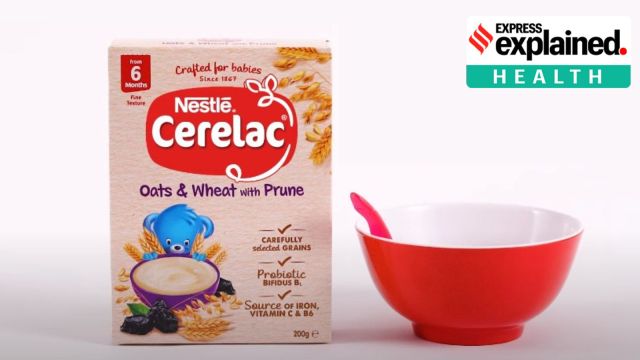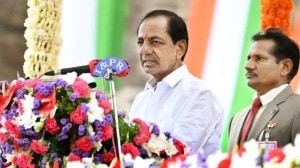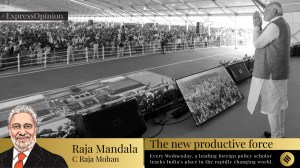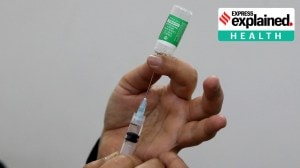- India
- International
Nestlé’s baby food sold in Asian, African countries had added sugars: Why is sugar harmful?
The same products sold in Europe did not have added sugars. Excess sugar consumption is associated with risks of obesity, and non-communicable diseases such as diabetes and high blood-pressure.
 Cerelac, which is meant for six-month-old babies, had no added sugars in Germany and the United Kingdom but contained over 5 grams per serving in Ethiopia and 6 grams in Thailand. (Via YouTube screengrab)
Cerelac, which is meant for six-month-old babies, had no added sugars in Germany and the United Kingdom but contained over 5 grams per serving in Ethiopia and 6 grams in Thailand. (Via YouTube screengrab)Nestlé’s products for babies in Asia, Africa and Latin America were found to contain added sugars, while the same products sold in Europe did not have it, according to a recent report.
This included the world’s biggest baby cereal brand Cerelac, which reportedly contained added sugars that averaged nearly 3 grams per serving when sold in Indian markets. Sugar is generally not recommended for infants, although guidelines in several developing countries do not explicitly prohibit it.
Public Eye, a Swiss organisation that undertakes investigations, public advocacy and campaigns, published the report in collaboration with the International Baby Food Action Network (IBFAN). It was based on tests on Nestlé products that were conducted in a Belgian lab.
A Nestlé India spokesperson told The Indian Express that in the last five years, the company has “reduced added sugars by up to 30 per cent, depending on the variant, in our infant cereals portfolio (milk cereal based complementary food).” What exactly did the report say about Nestlé, and why is added sugar harmful – particularly for babies? We explain.
What the report says on Nestlé
The report (‘How Nestlé gets children hooked on sugar in lower-income countries’) faulted Nestlé for employing different nutritional standards in its offerings, depending on the country it served. Nestlé also did not make the quantity of sugar content clear on the products’ packaging, it said.

“Nestlé’s leading baby-food brands, promoted in low- and middle-income countries as healthy and key to supporting young children’s development, contain high levels of added sugar. In Switzerland, where Nestlé is headquartered, such products are sold with no added sugar.”
If Nestlé products are not as nutritious as they seem to parents, it also has risks for children. Currently, Nestlé controls 20 percent of the baby-food market, valued at nearly $70 billion, according to Public Eye. It said the findings shed light on “Nestlé’s hypocrisy and the deceptive marketing strategies deployed by the Swiss food giant”.
“For example, in Switzerland, Nestlé promotes its biscuit-flavoured cereals for babies aged from six months with the claim ‘no added sugar’, while in Senegal and South Africa, Cerelac cereals with the same flavour contain 6 grams of added sugar per serving,” said the report.
Similarly, Cerelac, which is meant for six-month-old babies, has no added sugars in Germany and the United Kingdom but contains over 5 grams per serving in Ethiopia and 6 grams in Thailand.
India’s food safety regulator, Food Safety and Standards Authority of India (FSSAI), did not comment on the report. However, government officials said the lab reports of the samples from India will be sought, which will then be examined by the FSSAI’s subject expert committee.
Why are added sugars harmful?
Sugar is a simple carbohydrate. Some food items have sugar that is naturally occurring. According to the American Heart Association (AHA), it is “found in milk (lactose) and fruit (fructose). Any product that contains milk (such as yogurt, milk or cream) or fruit (fresh, dried) contains some natural sugars.”
Free sugar or added sugar is added separately to a food item during preparation or processing. It can “include natural sugars such as white sugar, brown sugar and honey, as well as other caloric sweeteners that are chemically manufactured (such as high fructose corn syrup),” the AHA says.
Public Eye reported that Nestlé’s baby food products with added sugars are “permitted under national legislation (of some countries) despite the fact that they go against World Health Organisation guidelines.” I
n 2015, the WHO’s guideline recommended that “adults and children reduce their daily intake of free sugars to less than 10% of their total energy intake.” It would be even healthier to consume less than 5% (roughly 25 grams per person a day) of free sugars, it said.
Sugar consumption is supposed to be kept limited for health reasons. Excessive consumption can lead to increased overall energy intake in a person’s overall diet. It may be at the cost of food items having nutritionally adequate calories, eventually leading to an unhealthy diet. The risks of contracting non-communicable diseases, such as diabetes, obesity and heart-related ailments, are then increased.
Rodrigo Vianna, epidemiologist and Professor at the Department of Nutrition of the Federal University of Paraíba in Brazil, told Public Eye: “Sugar should not be added to foods offered to babies and young children because it is unnecessary and highly addictive. Children get used to the sweet taste and start looking for more sugary foods, starting a negative cycle that increases the risk of nutrition-based disorders in adult life.” Tooth decay is also associated with early exposure to sugar.
What adds to concerns is the fact that low- and middle-income countries are increasingly being exposed to free sugars with growing incomes and the proliferation of giant global food brands that mass produce their products.
A 2017 report from the WHO (‘Incentives and disincentives for reducing sugar in manufactured foods’) said, “The fact that sugar is a relatively cheap and abundant ingredient is not a direct incentive to use it, but means there is little incentive from the supply side not to use it.” Adding sugar to a food item often makes it more palatable, meaning consumers will opt for it repeatedly.
A UNICEF-supported study from December 2023 found that of the 1,600 infant cereals, snacks and ready-to-eat meals marketed at young children in Southeast Asia, nearly half of the products (44 per cent) included added sugars and sweeteners.
WHO advises against the introduction of added sugars before the age of 2. A 2019 WHO study on baby foods also found that many products have “inappropriately high levels of sugar”.
“It’s important to recognise that babies have an innate preference for sweet tastes but the key is not to reinforce that preference and to expose them to a variety of different flavours and food textures,” Professor Mary Fewtrell, then nutritional lead, Royal College of Paediatrics and Child Health had told the BBC.
More Explained
EXPRESS OPINION
May 01: Latest News
- 01
- 02
- 03
- 04
- 05
































